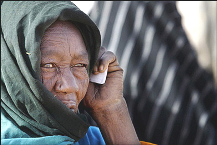International community split on ending Darfur conflict, experts say
By PAUL GARWOOD, Associated Press Writer
CAIRO, Egypt, Aug 25, 2004 (AP) — International inaction, led by the United Nations, to force Sudan’s government to end the violence in Darfur will result in more African people dying, foreign policy and genocide experts said Wednesday.
 Former White House official John Prendergast, Holocaust survivor and Nobel laureate Elie Wiesel and Pulitzer Prize-winning author Samantha Power demanded stronger action against the Sudanese government to protect more than 1 million Darfur villagers forced from their homes during the 18-month conflict.
Former White House official John Prendergast, Holocaust survivor and Nobel laureate Elie Wiesel and Pulitzer Prize-winning author Samantha Power demanded stronger action against the Sudanese government to protect more than 1 million Darfur villagers forced from their homes during the 18-month conflict.
During a teleconference organized by U.S. non-governmental organization Global Nomads Group, the three experts, plus an aid worker at a Chadian refugee camp and a Sudanese refugee, discussed the conflict in Darfur, which the United Nations describes as the scene of the world’s worst humanitarian crisis.
“The longer we wait and don’t do anything, the more people are going to die,” said Prendergast, an African specialist at the International Crisis Group, a Brussels-based think tank.
Prendergast criticized the United Nations for not issuing tough sanctions against Sudan, which has been accused of using government forces and backing the Janjaweed militia to drive African villagers from Darfur.
Sudan is unlikely to meet international demands to end violence against Darfur villagers unless it was threatened with tough U.N. sanctions, he said.
“We have to go right after the regime leadership with targeted sanctions,” Prendergast said, focusing on travel bans, economic embargoes and arms sanctions.
The former Clinton administration official believed the United Nations would not act tough, however, and would extend a deadline, which expires Aug. 30, against the Sudanese government to disarm the militias or face possible penalties.
If this happens, he said countries that have shown a desire to address the crisis, namely the United States, Britain and Australia, should act “unilaterally” against the Khartoum government.
Prendergast also supported African Union efforts to send a 3,000 peacekeeping force to Sudan and called for initial inquiries for possible future war crimes charges.
Aid was reaching only 50 percent of the people in need, he said, adding that the international community must double its relief efforts.
Power, who recently visited Darfur with Prendergast, accused the Sudanese government of giving militiamen jobs in the security forces to make it look like they were disarming them.
She also criticized fractured international efforts to end the crisis.
“I was really struck on the ground in Sudan of how divided the so-called international community is, (especially) when considering the humanitarian stakes,” she said.
Wiesel, who won the 1986 Nobel Peace Prize for his writings on the Holocaust and campaigning against world evil, bemoaned the loss of life in Darfur.
“What is at stake is our humanity,” Wiesel said during the teleconference. “What have we learned from the past? Not to be indifferent to torment.”
